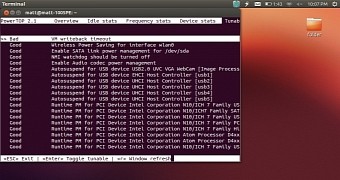Ritesh Raj Sarraf had the pleasure of informing us about the immediate availability of an updated Laptop Mode Tools software, version 1.68, which brings systemd integration, and many other goodies that help prolong your laptop's battery life.
According to the release notes, Laptop Mode Tools 1.68 adds parent identifiers, adds a timer-based polling for systemd, optimizes the .service file, improves the lmt-udev package to support the latest systemd init system, adds various AC enhancements for ultrabooks, and modifies the event check condition of the power_supply subsystem.
Furthermore, all the instances of the battery-level-polling module have been fixed, it is now possible to group kill the polling daemon terminating all of its child processes, the descriptor is now released explicitly, the battery level polling is now disabled by default, and there's new documentation for the newly added systemd files.
"I am pleased to announce the release of Laptop Mode Tools, version 1.68," says Ritesh Raj Sarraf. "This release is mainly focused on integration with the newer init system, systemd. Without the help from the awesome Debian systemd maintainers, this would not have been possible. Thank you folks."
Older SysV init systems are still supported
Last but not least, some new files have been added to Laptop Mode Tools 1.68, among which we can mention lmt-poll.service, laptop-mode.service, and laptop-mode.timer. They will all be documented very well in future releases so that users know what each one does.
Laptop Mode Tools will still support older SysV init systems. It is also worth mentioning that the lmt-poll.service file is similar in functionality to the battery-level-polling module, if one needs an alternative.
Download Laptop Mode Tools 1.68 right now from Softpedia. Please note that the software is distributed as a source archive, which requires compilation. You should check for an updated version of Laptop Mode Tools on the default software repositories of your GNU/Linux distribution in the coming hours or days.

 14 DAY TRIAL //
14 DAY TRIAL //